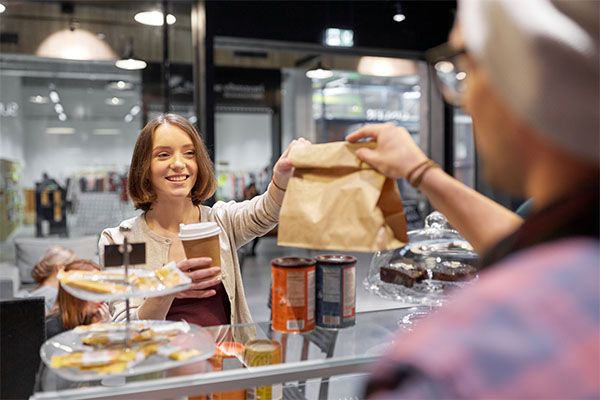Lesson 7: Convenience Store Food
I can talk about Korean convenience store foods.You will be able to talk about food in Korean convenience stores.
INTRODUCE
Many foreigners are surprised by how high-quality convenience store foods are in Korea. You can recommend them if your foreign friends are looking for inexpensive but good food.많은 외국인들이 한국 편의점 음식의 질에 놀란다. 외국인들이 싸고 맛있는 음식을 찾는다면 편의점 음식을 추천합니다.

PRESENT
STEP A VOCABULARY
I. Listen and repeat.듣고 반복.
 save money |  save time |
 read the label라벨을 읽다 |  like the selection선택처럼 |
 be tired of [thing] |  prefer food made from scratch처음부터 만든 음식을 선호 |
II. Which of the things above do you do or consider when buying take-out food? Choose two or three.테이크아웃 식품을 구매할 때 위의 사항 중 어떤 것을 하거나 고려합니까? 2개 또는 3개를 선택합니다.

III. Practice reading the words.
 / t / |  / b / |
|---|---|
time | bite |
tired | bored was bored |
tie | buy |
STEP B GRAMMAR TIP
Negative questions are used to ask, clarify, or react to something.
부정 의문사는 부정의 의미로 무엇을 묻거나 확인하거나 예상치 못한 감정을 표현할 때 사용합니다.UNDERSTAND
SPEAKING
Ai and Sho were eating lunch in the breakroom when Tim came in to ask a question.
Ai와 Shaw는 휴게실에서 점심을 먹었습니다. 팀이 질문을 하러 왔습니다.
 |
- Tim:
Hey, guys. Do you know where I can get lunch to go? I have a meeting in twenty minutes.
- Ai:
How about the restaurant across the street? Their pre-made salads are really good.
- Sho:
I recommend the convenience store downstairs. Just grab a sandwich or lunch box there.
- Ai:
Sho, are you serious? Don't you have any better suggestions?
- Sho:
Well, I always eat convenience store food.
- Ai:
Aren't you tired of eating it? I mean, don't you basically eat cup noodles or corndogs every day?
- Sho:
That's not true. I buy rice balls there too.
- Ai:
(sigh) It's fine to eat that stuff sometimes, but not every day! Don't you read food labels? Most convenience store foods are really high in salt. They're bad for your health.
- Sho:
It's okay. They save time and taste good.
- Ai:
Sho! (sigh) I'll send you an easy recipe later. Please try to make your lunch at least one day next week, okay?
TRIVIA
In Japan, many convenience stores sell American dogs, but that is actually Japanese English. Native speakers call them corndogs. Many Americans are very amused when they hear the Japanese name for corndogs.
"American dogs" are sold at convenience stores in Japan, but "American dogs" are Japanese-made English. In English it is called "corn dogs". Americans find it very interesting to hear the name "American dog".

PRACTICE
STEP A EXERCISE
Complete the conversation. Change the sentences in the parentheses into negative questions.괄호 안의 문장을 부정 의문사로 바꾸어 대화를 완성하세요.
- Tutor:
Let's order coffee.
- Student: Student:
(You drank coffee earlier.)
- Tutor:
Yeah, but I still want some more. I'm tired.
- Student: Student:
All right. I'll have a soda.
- Tutor:
By the way, after this, can we go to that Japanese restaurant down the street?
- Student: Student:
Oh, really? I thought we could eat here. (You like the selection.)
- Tutor:
They don't have any Japanese food here. I really want noodles or something.
- Student: Student:
Oh, okay. But, um, that restaurant is kind of expensive. (You're trying to save money.) I thought you were saving up for a trip overseas.
- Tutor:
Well ...

STEP B EXERCISE
Make negative questions using the pictures and words. 그림과 단어를 사용하여 부정 의문문을 만드십시오.

ex. that ramen / really hot
→ Isn't that ramen really hot?
1. you / read the label



CHALLENGE
Challenge 1
You just ran into your friend inside a convenience store.
Do the following:
- Ask your friend what he/she usually buys there.
- Ask your friend how often he/she buys food there.
- React to your friend's eating habits.
아래 지침을 따르십시오.
· 친구에게 편의점에서 무엇을 살지 물어보세요
・ 친구에게 편의점에서 얼마나 자주 음식을 사냐고 물어보세요.
· 친구의 식습관을 댓글로 남겨주세요.
Today's grammar tip
- negative questions
 |
Challenge 2
Discuss your ideas.Let me give you your opinion.
 If Time
If TimeAllows
FEEDBACK
LESSON GOAL ACHIEVEMENT
4
Very GoodCould complete the task with ease
3
GoodCould complete the task with some clarifications
2
FairCould complete the task with additional instructions
1
PoorCould somehow complete the task with difficulty
PERSONALIZED FEEDBACK
- RANGEHow much can you use the vocabulary?
- ACCURACYWhether the accuracy grammar is used correctly
- FLUENCYWhether you can speak fluently and smoothly
No comments:
Post a Comment